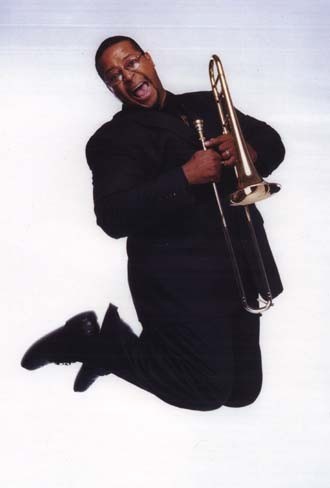"I'll call Ron Wilkins," the bandleader told me.
But Wilkins was a trombonist and these were saxophone parts. He had never played with this band before; and given the musicians' tight schedules, it was going to be impossible get everybody together to rehearse before the gig. "Don't worry," said the leader. "Ron's a genius."
The day of the festival arrived. As we prepared for our set, Wilkins bounded on stage, greeting everybody with his trademark booming voice. The first tune was tricky, beginning with a unison horn
| Ron Wilkins jumpin' the bone. |
Wilkins is a man of a thousand voices. He plays euphonium, tuba, and six different trombones (soprano, alto, small and large tenor, bass, and contrabass). The sounds he coaxes from them range from muted trumpet-like to elephantine. He can sing in almost any style; his Louis Armstrong imitation on "What a Wonderful World" (an exercise which, in the wrong hands, could quickly deteriorate into shtick) is uncanny in its authenticity, respect, and attention to nuance. His solos demonstrate extraordinary technique; perfectly pitched 16th-note runs tumble from his horn as if bursting to get out. And on a recent improvisational duet recording project with German pianist Heinrich Thein, his trombone takes on the quality of a classical French horn.
A man of a thousand tunes - standards, R&B, funk, pop - his near-photographic memory holds thousands of compositions. "That stuff floats in my head all the time," he says.
Wilkins grew up in a military family on the East Side of San Antonio, near Wheatley Courts. The middle of three brothers, he was a good student. "Getting in trouble was not an option. Dad could crack a mean whip," he says of his father, a former drill sargeant, who was known to haul his sons out of bed at 5:30 a.m. on Saturday to clean house. A voracious reader and a talented athlete, Wilkins wrote plays and poetry, he scored high on IQ tests, and he had an incredible ear. A natural mimic, he wowed community audiences with convincing impressions of great orators like Martin Luther King Jr. and John F. Kennedy. Not until his sophomore year in high school did he become fully aware of the extent of his aural gift. After listening to him improvise, his band director at Roosevelt, Ken Turner, called him into his office.
"He asked me if I had perfect pitch. I said, 'No, why?' He said, 'Because you hear things most people around here don't.' He then proceeded to play through some stuff on the piano. I didn't miss a note. That was when I realized, 'Uh oh, I'm different.'"
Wilkins went on to study jazz at North Texas State (now the University of North Texas), but the way was far from smooth for the young musician. His father had been diagnosed with multiple sclerosis; in high school, Wilkins, a power lifter, had assisted in his everyday physical care. Just off the road with Clark Terry's College All-Star Band (which included a young Branford Marsalis), he got a call from his mother.
"She said, 'Come home; Dad needs you.' So I did."
Wilkins later graduated from University of Texas at San Antonio, married, and enlisted in the Air Force, where he was a featured instrumentalist and vocalist with the USAF Band of the West. A successful
| RON WILKINS For gig information go to http://pages.prodigy.net/rnrwilkbeek/ |
Wilkins is working on his second album as a leader. His first, A Tribute to the Masters, was exactly that - an homage to, and interpretation of, the voices that shaped his music and his life: Charlie Parker, Louis Armstrong, Duke Ellington, Luis Bonfa, Theloneous Monk. The next album will contain more original material, with more intensity, and a harder edge.
It sounds like the man of a thousand voices will be concentrating on only one this time around: his own inner voice. What a wonderful world. •

















